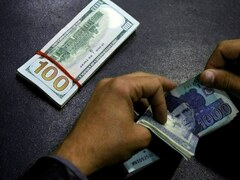China coal futures slump as gov't signals intervention to ease power crisis
BEIJING: China's thermal coal futures fell by their trading limit for the third evening session in a row on Thursday, extending losses triggered by signs Beijing may intervene to cool surging prices and ease a widespread power crunch.
China is pushing miners to ramp up coal production and is increasing imports so that power stations can rebuild stockpiles before the winter heating season, but analysts say shortages are likely to persist for at least another few months.
The state planner, the National Development and Reform Commission (NDRC), said on Tuesday it was studying ways of intervening to lower coal prices and would take all necessary steps to bring them into a reasonable range.
At the start of Thursday's night session on the Zhengzhou Commodity Exchange, the most-active thermal coal futures contract, for delivery in January, plummeted the maximum 14% to 1,365 yuan ($213) per tonne. That came after the contract finished day-time trade down 11% and brought the overall decline in prices since Tuesday's all-time peak of 1,982 yuan to more than 31%.
The contract was trading down 10.6% at 1,420 yuan as of 1354 GMT, still up almost 170% year-to-date. Coking coal and coke futures on the Dalian Commodity Exchange were both trading around 6% lower on Thursday evening, having fallen by the maximum 12% in day-time trade.
Despite recent swings in coal prices, higher energy, labour and other costs are now expected to persist and be passed on to end-consumers, economists and analysts have said. Chinese law allows the State Council, the country's cabinet, and regional governments to limit profit rates and set price limits when prices for important goods or services rise sharply, the NDRC said earlier this week. It vowed to crack down on any irregularities and maintain market order.
On Thursday, the NDRC said it had mobilised its regional arms as well as key coal enterprises to conduct a special survey on coal output and distribution costs and prices as part of its research into how to intervene.
A shortage of coal, China's main fuel for power generation, has led to electricity rationing for industry in many regions, weighing on growth in the world's second-biggest economy. China is the world's biggest producer and consumer of coal, and has been increasing output to meet demand.
The NDRC had said it would ensure coal mines operate at full capacity and aim to raise output to at least 12 million tonnes per day. Some major coal miners have vowed to cap prices, and China's energy administration has urged power grid firms to maximise purchases of electricity from renewable sources.
China Energy Group, the country's top coal miner and largest power producer, said on Thursday that its coal output from Oct. 1 to 20 increased by about 2.26 million tonnes, or 7.5% compared with the same period last year. The state-owned mining and energy company added that total power generation in the same period was 54.78 billion kilowatt hours (kWh), up 15% year-on-year, of which thermal power generation rose by 6.36 billion kWh, up 17.2%.
China's securities regulator has asked futures exchanges to raise fees, restrict trading quotas and crack down on speculation in response to high coal prices. The government took its boldest step in a decade of power sectors reform by allowing coal-fired power plants to pass on the high costs of generation to some end-users via market-driven electricity prices from Oct. 15. "The tariff rise was inadequate to make most coal-fired independent power producers profitable," Citi analysts said in a note to clients on Thursday.
China is not the only country trying to cool hot energy prices. Authorities from Beijing to Berlin are taking steps to try to deal with them to contain rising inflationary pressures that are putting at risk a global recovery from the COVID-19 pandemic.
The heat in energy markets underlines the scale of the task facing world leaders who are under pressure to map out plans to wean their economies off fossil fuels at the COP26 U.N. summit climate talks that start on Oct. 31. Beijing has been trying to reduce its reliance on polluting coal power in favour of cleaner wind, solar and hydro.
Citi analysts expect China's coal-fired power generation will drop 86% from 4,658 million megawatt hour (MWh) in 2020 to 653 million MWh in 2060 as cleaner energy plants come online. China's State Grid said on Wednesday that coal stocks at power plants in the northeast had climbed to 78% of last year's level as of Oct. 16, but it did not provide outright volumes.
























Comments
Comments are closed.